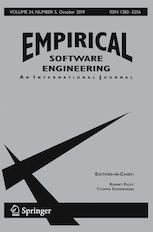Empirical Software Engineering - An International Journal
Editor-in-Chief: Robert Feldt; Thomas Zimmermann
ISSN: 1382-3256 (print version)
ISSN: 1573-7616 (electronic version)
Journal no. 10664
Facebook: facebook.com/emsejournal
Twitter: @emsejournal

Call for Papers — EMSE Special Issue on “Recommendation Systems for Software Engineering”
A special issue of the Empirical Software Engineering Journal.
Editors of the Special Issue
- Ali Ouni (ETS Montreal, University of Quebec, Canada), ali.ouni@etsmtl.ca
- David Lo (Singapore Management University, Singapore), davidlo@smu.edu.sg
- Xin Xia (Monash University, Australia), xin.xia@monash.edu
- Alexander Serebrenik (Eindhoven University of Technology, the Netherlands), a.serebrenik@tue.nl
- Christoph Treude (University of Adelaide, Australia), christoph.treude@adelaide.edu.au
Description of the Special Issue
Software engineering has experienced an exponential growth and advanced rapidly over the last few years leading to an explosion of available data and knowledge from different software engineering activities in both the open source and industry worlds. Software engineering is widely acknowledged to be a human-based and knowledge-intensive activity. Such activities include requirements engineering, software project management, design, coding, testing, quality assurance, maintenance, and evolution using different technologies.
The availability and access to different software engineering technologies such as version control systems, bug/issue tracking systems, third-party software library ecosystems, projects personnel communications, modern code review platforms as well as online Q&A platforms, represent an important and unique asset to provide better support to software practitioners and foster the growth of software engineering. Such valuable knowledge and information could be used to develop actionable, accurate and scalable recommendation systems and approaches to better support the maintenance of software systems, improve software design and reuse, write effective issue reports, manage the progress of software projects, find refactoring opportunities, support predictions about software development, and planning for future development. Software engineering recommendation systems aim also at providing support to developers to overcome information overload, perform information discovery tasks and approximate computation. These ease the developers’ decisions when performing particular tasks and help them to find relevant information, or warn them about the implications of their decisions.
This special issue focuses on recommendation systems for software engineering. We seek studies that target the design and evaluation of novel recommendation systems for software engineering that can assist developers in a wide range of activities, from requirements to source code manipulation and evolution. Recommendation systems may use different techniques from machine learning, search-based algorithms, probabilistic methods, data mining, and so on. The evaluation of such recommendation systems may be quantitative (through open source or industrial data), qualitative (involving developers), or experimental. We are particularly looking for innovative papers that address all levels from requirements, design, documentation to source code manipulation, maintenance and evolution, providing new ways to handle these problems or addressing them in a more unified/systematic manner, discussing benefits, limitations and costs of provided solutions.
The evaluation of papers will be based on:
- Underlying methodological soundness and rigor
- Novelty of the work
- The quality of the reporting
- Strength of empirical evaluation/basis
- Significance and reproducibility of the results
Submission Topics
The topics of interest include, but are not limited to challenges, solutions, and innovations for recommendation systems for software engineering with respect to :
- API recommendation
- Service recommendation
- Bot applications
- Code review
- Bug localization
- Software changes
- Best practices for software engineering
- Software reuse
- Software quality
- Code smells
- Refactoring
- Remodularization
- Maintenance
- Testing
- Software design and modeling
- Software migration
- Source code manipulation
- Documentation
- Software process
- Performance monitoring
- Software management
- Reliability of software systems
- Software product lines
- Program repair
In addition to description of novel approaches to design of recommendation systems in the aforementioned domains, we seek submissions reporting on
- Evaluation of recommendation systems related to the aforementioned topics
- Empirical studies based on recommendation systems related to the aforementioned topics
- Applications of recommendation systems to support software engineering processes in industry, NGOs, cultural institutions, and the public and private sector
- Replication studies of previously published studies pertaining to recommendation systems related to the aforementioned topics
Schedule
- Submission Deadline: extended until May 15, 2020
(was: April 30,20) - First Review Notification: extended until August 31, 2020
Submission Instructions
Papers should be submitted through the Empirical Software Engineering editorial manager website (http://www.editorialmanager.com/emse/) as follows (1) select “Research Papers” and (2) later on the Additional Information page:
- Answer “Yes” to “Does this paper belong to a special issue?”
- And select “Recommendation Systems for Software Engineering” for “Please select the issue your manuscript belongs to”.
For formatting guidelines as well as submission instructions, visit http://www.springer.com/computer/swe/journal/10664?detailsPage=pltci_2530593